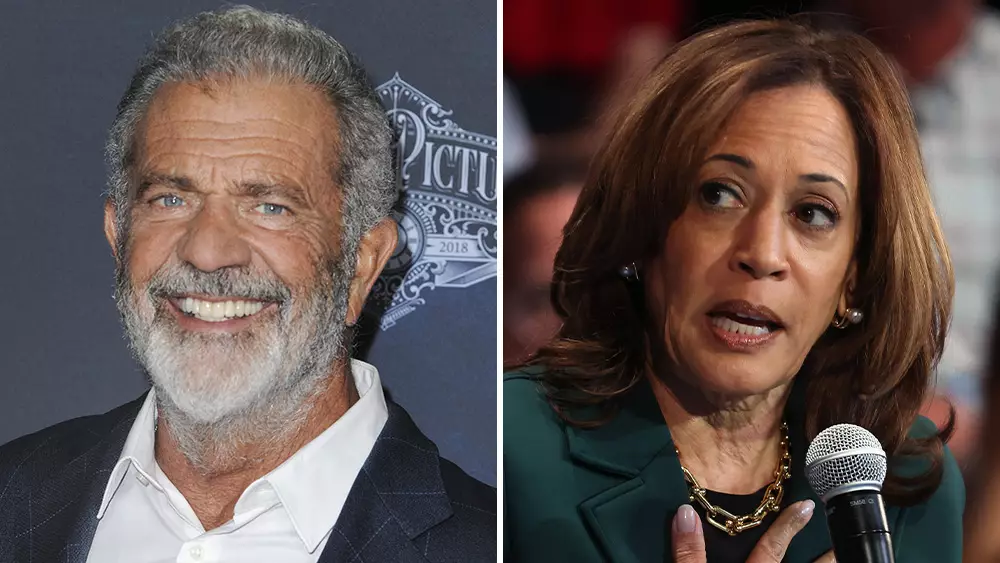Mel Gibson, a figure admired for his cinematic accomplishments, is equally notorious for his incendiary behavior and controversial statements. Recently, his directorial talent received praise from actor Andrew Garfield, who commended Gibson’s personal growth and “beautiful healing.” However, Gibson’s latest remarks, particularly concerning Vice President Kamala Harris, raise eyebrows and evoke a critical response, inviting us to examine the contradictions of his public persona more closely.
In an encounter captured by TMZ at LAX, Gibson made headlines by stating that Kamala Harris possesses the “IQ of a fence post.” This comment, steeped in derogatory language, appears to align him with the polarizing narratives that characterize contemporary political discourse. Furthermore, Gibson publicly announced his support for Donald Trump, suggesting that another term for Trump would be “good” for the nation. Such statements overshadow his past efforts to rehabilitate his image, illustrating a troubling pattern of behavior rather than an era of learned humility.
The harshness of Gibson’s comments isn’t merely an isolated incident; it invokes memories of his past indiscretions. His history is punctuated by numerous statements that many would consider unacceptable, including the infamous antisemitic tirade he unleashed during a DUI arrest in 2006. Traditional wisdom suggests that healing and personal growth involve recognizing one’s missteps, yet Gibson’s recent comments suggest a regression to the very attitudes that once defined his public downfall.
In addition to his past remarks about Jews, Gibson has also made misogynistic comments, like the “sugartits” insult directed at a police officer. The juxtaposition of such offensive language against his claimed journey of healing raises serious doubts about his sincerity. Indeed, it forces onlookers to grapple with the question—can a person truly change if they continue to embrace harmful rhetoric?
Gibson’s comments are not uniquely his: they resonate with a broader trend where public figures engage in inflammatory rhetoric. Former President Trump, for instance, has a history of degrading remarks about Harris, which Gibson’s comments seem to align with rather than challenge. By participating in this type of dialogue, Gibson not only diminishes his own potential for redemption but contributes to the toxic political culture that stigmatizes critical discussion and civil discourse.
Both Harris and Trump have utilized strong language against each other, with Harris referring to Trump as “increasingly unhinged.” This aggression weakens the possibility of constructive dialogue and, instead, deepens divisions among various political factions. Accordingly, figures like Gibson, who use their platforms for disparaging remarks rather than enlightened discussion, may inadvertently rally support for a culture of disparagement, stalling the progress he may have purportedly made in his personal life.
As an artist, Gibson’s comments impact not just his own reputation but also the narratives we create around public figures and their responsibility towards society. His recent remarks serve as a reminder that celebrity influence carries weight and must be handled with care. If Gibson continues to voice such divisive opinions, he may alienate allies and fans who once respected his creative prowess.
Moreover, the question arises: can Gibson reposition himself as a thoughtful artist who contributes positively to cultural conversations, or will he remain entrenched in a worldview marked by disdain and derision? The answer dictates not just his future as a filmmaker but the cultural messages that art seeks to propagate.
The discourse surrounding Mel Gibson serves as a crucial reflection of our societal values and the complexities of personal growth. While it is possible for individuals to overcome past errors, Gibson’s continual alignment with derogatory rhetoric against marginalized groups calls into question the authenticity of his ‘healing.’ In moving forward, both Gibson and the public must engage in deeper self-reflection regarding the power of words and the necessity for respect in dialogue, especially in an era characterized by division and misunderstanding. Only through meaningful engagement can we hope to achieve progress, both personally and collectively.

